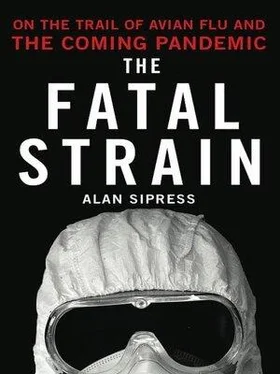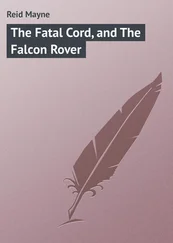301 unusually resistant to experimental vaccines:See, for example, Karl G. Nich olson et al., “Safety and Antigenicity of Non-adjuvanted and MF59-adjuvanted Influenza A/Duck/Singapore/97 (H5N3) Vaccine: A Randomized Trial of Two Potential Vaccines Against H5N1 Influenza,” Lancet 357, no. 9272 (June 16, 2001): 1937-43; Jean-Louis Bresson et al., “Safety and Immunogenicity of an Inactivated Split-Virion Influenza A/Vietnam/1194/2004 (H5N1) Vaccine: Phase I Randomised Trial,” Lancet 367, no. 9253 (May 20, 2006): 1657-64; Isabel Leroux-Roels et al., “Antigen Sparing and Cross-Reactive Immunity with an Adjuvanted rH5N1 Prototype Pandemic Influenza Vaccine: A Randomised Controlled Trial,” Lancet 370, no. 9587 (Aug. 18, 2007): 580-89; and Nega Ali Gogi et al., “Immune Responses of Healthy Subjects to a Single Dose of Intramuscular Inactivated Influenza A/ Vietnam/1203/2004 (H5N1) Vaccine After Priming with an Antigenic Variant,” paper presented at Third WHO Meeting on Evaluation of Pandemic Influenza Prototype Vaccines in Clinical Trials, Geneva, Feb. 15-16, 2007.
302 This could cut the production time:Peter F. Wright, “Vaccine Preparedness—Are We Ready for the Next Influenza Pandemic?” NEJM 358, no. 24 (June 12, 2008): 2540-43.
302 Initial clinical trials:Hartmut J. Ehrlich et al., “A Clinical Trial of a Whole-Virus H5N1 Vaccine Derived from Cell Culture,” NEJM 358, no. 24 (June 12, 2008): 2573-84.
302 than even seasonal flu shots:David Brown, “Bird Flu Vaccine Shows Promise,” Washington Post, July 27, 2006; Leroux-Roels, “Antigen Sparing”; and Suryaprakash Sambhara and Gregory A. Poland, “Breaking the Immunogenicity Barrier of Bird Flu Vaccines,” Lancet 370, no. 9587 (Aug. 18, 2007): 544.
302 could radically increase:WHO, “Projected Supply of Pandemic Influenza Vaccine Increases Sharply,” press release, Oct. 23, 2007.
302 “can’t provide vaccines to the world free”:Wayne Pisano, quoted in a Council on Foreign Relations letter from Laurie Garrett, senior fellow for global health, June 20, 2007.
302 a local vaccine against hepatitis B:Tini Tran, “Vietnam Struggles to Rein In Hepatitis B,” Associated Press, July 17, 2000.
302 a new generation of vaccines:“Health: Vietnam Successfully Produces Second Generation Hepatitis Vaccines,” Vietnam News Briefs, Apr. 11, 2002.
303 “future availability to Vietnam is doubtful”:“Report of WHO Mission to Support Influenza A/H5N1 Vaccine Development in Vietnam,” 2005.
303 “serious ethical reservations”:Ibid.
304 “the volunteer ‘spirit’ may not be universally shared”:Internal WHO document, 2005.
304 monkey kidney cells:“Vietnam-made Bird Flu Vaccine Proves Effective,” Vietnamese News Agency, Aug. 22, 2008.
304 on researchers at the institute:“Volunteers for H5N1 Vaccines Get Second Injection,” Vietnamese News Agency, May 17, 2008.
304 student volunteers:Ibid.
304 “Good results”:Tranh Dinh Lam, “Vietnam: Bird Flu Vaccine for Humans May Be Available by 2009,” Interpress Service, June 4, 2008.
304 mass production by late 2009:“Vietnam-made Bird Flu Vaccine Proves Effective,” Vietnamese News Agency, Aug. 22, 2008.
304 30,000 Vietnamese dong:Ibid.
304 Siti Fadilah Supari was far less patient:The accounts of Supari’s political rise, her battle over the sharing of viruses, and the wider international dispute over samples and benefits are drawn from interviews with Supari, current and former officials of the Indonesian health ministry, and other Indonesian public health officials and political figures. It also draws on interviews with WHO officials and public health and diplomatic officials from the United States, Australia, and other countries, as well as documents from the Indonesian health ministry, WHO, and the U.S. Department of Health and Human Services.
305 Her scheduled flight:Details of Supari’s trip to Geneva are drawn from Siti Fadilah Supari, It’s Time for the World to Change: In the Spirit of Dignity, Equity, and Transparency, Divine Hand Behind Avian Influenza (Jakarta: Sulaksana Watinsa Indonesia, 2008), 112ff.
306 “We do not really know”:Statement by the Minister of Health of the Republic of Indonesia H. E. Dr. Siti Fadilah Supari at the Inter-Governmental Meeting for Pandemic Influenza Preparedness, Geneva, Nov. 20, 2007.
307 her cell phone rang:Yanto Soegiarto, “Diving into the Deep End,” Globe Asia, Oct. 2007.
309 a running dispute with foreign scientists:The account of the NAMRU dispute is based on interviews with Andrew Jeremijenko, other NAMRU staff, and Indonesian health ministry officials.
309 “difficult to get the damn virus”:Interview with Jeremijenko.
310 cease all activities:“Circular Regarding the Status of NAMRU-2,” Oct. 25, 2005, signed by Secretary Titie Kabul Adimidjaja, acting head of Badan Litbangkes.
312 “I never gave permission”:Wahya Dhyatmika and Pramono, “WHO’s Virus?” Tempo, Feb. 20, 2007.
312 unless they met Supari’s demands:The Indonesian position is best detailed in Endang R. Sedyaningsih et al., “Toward Mutual Trust, Transparency and Equity in Virus Sharing Mechanism: The Avian Influenza Case of Indonesia,” Annals of the Academy of Medicine (Singapore) 37, no. 6 (June 2008): 482-88. Supari was one of the authors on this paper written by Indonesian health ministry officials. The position prevailing in many developing countries, in particular the United States, is well articulated in Richard Holbrooke and Laurie Garrett, “‘Sovereignty’ That Risks Global Health,” Washington Post, Aug. 10, 2008. An Indonesian response to the column by Holbrooke and Garrett is Makarim Wibisono, “The Responsible Virus and Sharing Benefits,” Jakarta Post, Aug. 27, 2008. Wibisono was the Indonesian ambassador to the United Nations in New York and in Geneva.
313 Her attack was unprecedented:For a discussion of the global health issues raised by Indonesia’s decision to withhold virus samples, see Chan Chee Khoon and Gilles de Wildt, “Developing Countries, Donor Leverage, and Access to Bird Flu Vaccines,” DESA Working Paper no. 41, UN Department of Economic and Social Affairs, June 2007.
313 viruses were biological resources:On two rival interpretations of international law governing virus samples, see David P. Fidler, “Influenza Virus Samples, International Law, and Global Health Diplomacy,” Emerging Infectious Diseases 14, no. 1 (Jan. 2008): 88-94.
313 “WHO has become a target”:Personal notes of conversation.
314 “Indonesia’s leadership alerted”:“RI ‘Will Not Share’ Flu Samples,” Jakarta Post, Feb. 7, 2007. The joint statement issued after the meetings between Supari and Heymann is “Sharing of Avian Influenza Viruses and Pandemic Vaccine Production,” Joint Statement from the Ministry of Health of Indonesia and the World Health Organization, Feb. 16, 2007.
314 “the answer is still no, no, no”:Wahya Dhyatmika and Pramono, “WHO’s Virus?” Tempo, Feb. 20, 2007.
314 The Indonesian leader stressed:“RI Stresses Need for Production of Affordable Bird Flu Vaccines,” Antara news agency, Apr. 4, 2007.
Читать дальше











